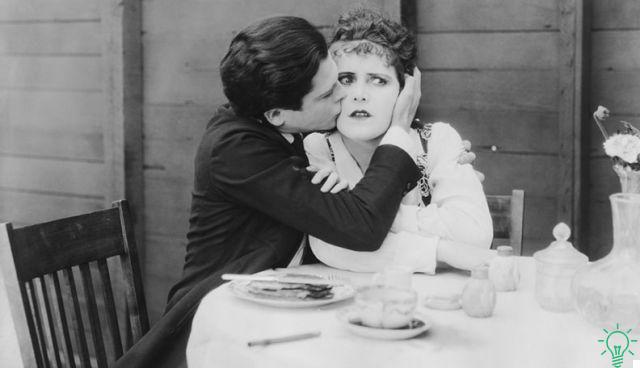
Love should never be an excuse. It shouldn't be an excuse to check each other out. Limit it. Generate the sense of guilt. Manipulate it ... Love is free or it is not. Unfortunately, the line between love and possession is often so thin that it is not difficult to overcome it.
Therefore, when someone justifies their possessive behaviors by saying that they love us very much and even take the power to make decisions for us, claiming that they are doing it for "our good", all alarms must go off.
Possessive love that arises from the ego
When someone tells us that they love us very much, their words generate an emotional resonance, so that we overlook the fact that it is a rather poor excuse. We don't realize that possessive love can become a straitjacket that, although it can be sweet at times, doesn't stop limiting us.
Possessive love is the expression of an ego trying to satisfy itself through the other and the relationship. The problem is that the ego usually has a very limited view of reality, it only accepts its point of view and its way of loving.
The ego wants things to go according to its plans, for the world to bend to its desires, and if something doesn't meet its expectations, it is likely to throw a tantrum, like a small child. For this reason the ego will try to control the loved one.
The control mechanism he uses is love. He uses love as a weapon to adapt the relationship to his patterns because, deep down, he believes that everything is worth when you love. So he ends up using love to justify his possessive behaviors and in some cases it even becomes a bargaining chip.
Possessive love can present itself under different masks:
• He needs us to satisfy his desires while ours are continually relegated to the background
• He uses manipulative mechanisms such as emotional blackmail, threats or even the use of silence to get what he wants
• Pretends to be a victim, making us feel guilty because we don't love him or her as much as he or she supposedly loves us
• Develop controlling behaviors to the point of wanting to make decisions for us, claiming that it is for our good and for the relationship
Possessive love does not respect the other or seek his fulfillment, but wants to hold him hostage to satisfy the ego's demands. Therefore, it is not surprising that several studies have found that in love, possessive behaviors and jealousy often lead to an unsatisfactory relationship and destructive behavior.
Learn to love
In life, quantity tends to outweigh quality. It is easier to count than to appreciate. Speaking in terms of quantity is easier than diving into the rich universe of adjectives that we could use to qualify things. This is why many times we end up prioritizing quantity over quality. But love cannot be measured, it is felt.
Love is not a competition. We don't win someone's affection by loving them more, but by loving them better. To love better means to open up to that sea of small qualitative details that enrich a relationship beyond the narrow terms of "much" or "little".
Loving better means being able to deactivate our ego to allow the other person to love us in total freedom. To love better means to support the growth of the other, encouraging him to fly with his own wings. To love better means to leave room for spontaneity and authenticity, rather than wanting to control everything.
Mature love is that which offers itself freely and which respects the freedom of the other, so that every personal project has a place in the relationship. It involves recognizing that emotionally connecting with someone does not mean having power or rights over that person.
Leave possessive love behind to enter mature love
Most of us experience some fear and insecurity in our closest relationships. As soon as we have something, we are assailed by the fear of losing it. These feelings can come from deeper struggles or even from our childhood. A study conducted at the University of Houston, for example, revealed that people with an anxious attachment style tend to be more jealous, trust their partner less, and are more prone to psychological abuse.
Low self-esteem, low self-confidence, fear of rejection or even a weak ego that needs to continually reassert itself can underlie those emotions that generate the desire for control. However, some people, instead of trying to figure out where those feelings are coming from, simply project them onto us and start controlling us, hoping to relieve those painful feelings.
Unfortunately, because those feelings are ingrained in their life story, they rarely, if ever, get the reassurance they seek by applying those defense mechanisms. Instead, they just repeat maladaptive patterns they have learned and introduce into their current relationships, choking on their partner, friends, or children.
Realizing that these insecurities come from the past is an important step in shedding their burden so that they no longer guide decisions and behaviors. But it is also important to develop personal dignity; that is, to be aware that we are all worthy of being loved. When we love each other enough, we don't need to tie anyone up in a straitjacket. Then love takes the leap and we stop thinking about how much we love to focus on how we love.


























